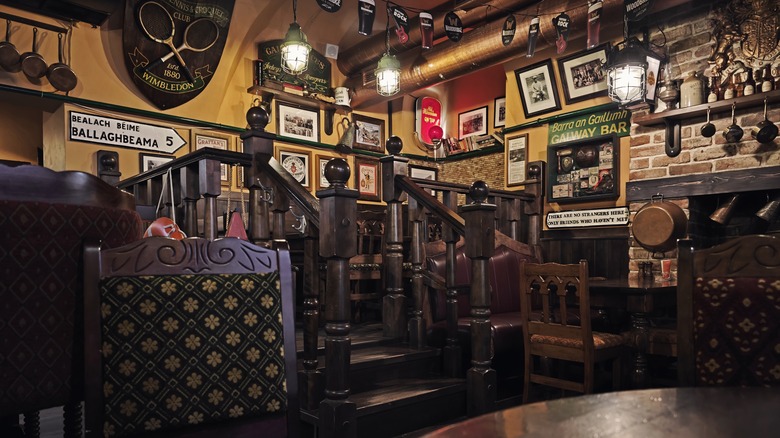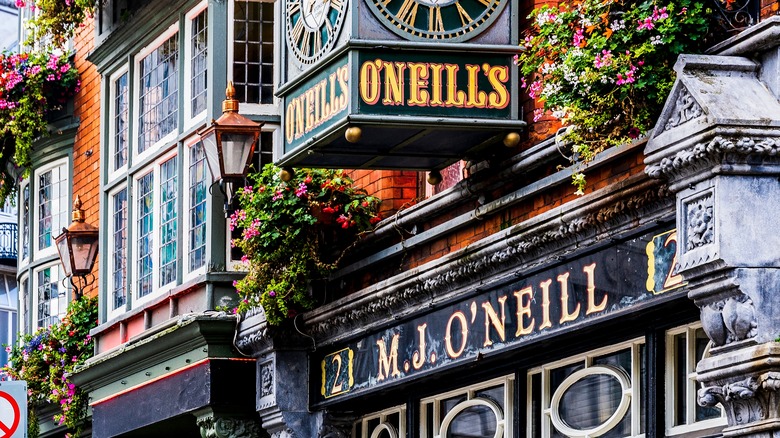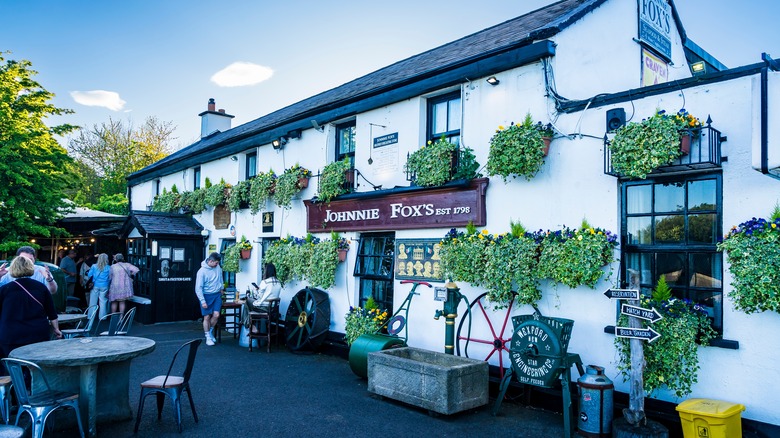The Reason So Many Irish Pubs Are Named After People
Though a gathering place for drinking is something common across the globe, the variety you find in Irish pub culture is probably unlike that in any other locale, even Irish pubs abroad. There may be a lot of great Irish pubs in America, and you can even rent an inflatable Irish pub for your next gathering, but it's not a patch on the real thing. But while there are a lot of aspects of being in an Irish pub that make it stand out, there's one you might never have considered before: Why are so many Irish pubs named after people?
Flanagan's, O'Neill's, O'Brien's, McFadden's — it's often harder to find an Irish pub that doesn't have someone's name associated with it than one that does even today, as more than half of Irish pubs in the U.S. involve either a first or a last name. It turns out there's a reason for that beyond it simply being A Thing People Do: It actually comes from late 19th century legislation associated with the rule of the English over Ireland.
Irish pubs were named as a matter of law
It's no secret that the Irish were not fans of British rule, and why would they be? Ever since the 17th century reconquest of Ireland by Oliver Cromwell, things hadn't been great; Cromwell himself had sent thousands of Irish political prisoners into forced labor in Barbados. Centuries later, the Irish still understandably had not given up their distaste for their British overseers, and one of the things the English blamed was alcohol use and public drunkenness. To this end, they decided to try and legislate the problem away.
The Licensing Act of 1872 had a whole bunch of provisions aimed in this direction. A couple of them were probably beneficial — improved sanitary standards are generally regarded as a good thing — but many more were designed as tools of control, such as restricting bar operating hours and harshly punishing public intoxication. But there was another important stipulation: All pubs had to display the owner's name over the door. The reason for this was to make it easier to hold proprietors accountable when the law was broken — the authorities could simply look at the name across the front of the pub and know who to talk to since this was obviously long before you could simply Google who owned what building.
Pub-naming laws eventually became tradition
Though Ireland would gain its independence from England in 1921, and the Licensing Act of 1872 no longer applies today, what it fostered became a tradition. What had once been a legal requirement was shifted into being a celebration of Irish heritage and history.
This was true not just in Ireland but abroad, thanks to immigration. In the mid-1800s, Ireland suffered through the Great Famine (or the Irish potato famine), the worst famine to affect Europe that century. This led to a huge influx of Irish immigration to America, particularly in the Northeast; between 1820 and 1860, more than one-third of all immigrants to the United States were from Ireland. Unsurprisingly, many of these immigrants eventually opened authentic Irish pubs in the mid-to-late 19th century. These immigrants wanted to feel connected to their homeland, so thanks to the law across the pond established around the same time, it became traditional for these pubs to carry the names of their owners.
Giving pubs the names of their publicans may have started as a law forced upon them by the English, but adopting it as their own became part of not just the Irish identity but that of Irish immigrants the world over. As such, it's an important cultural signifier that unites the Irish diaspora even to this day.


